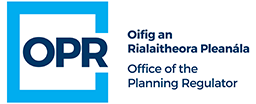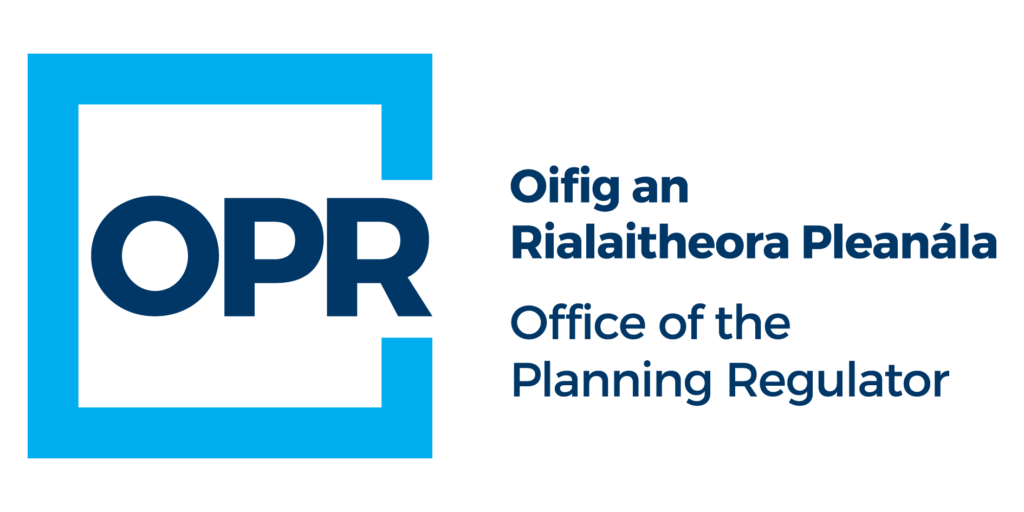The Office of the Planning Regulator (OPR) has today, 20 December, published its Report on the Second Phase of the OPR’s Review of Certain Systems and Procedures used by An Bord Pleanála.
This second and final report arising from the OPR’s current review of An Bord Pleanála contains a total of 23 recommendations.
The findings from this phase of the review, which build on the 11 recommendations contained in the report arising from the first phase (published on 4 October), indicate an urgent need for a ‘reset’ in the way An Bord Pleanála delivers its functions.
The Report examines the robustness and effectiveness of decision-making practices, organisation of work, governance arrangements and casefile handling in An Bord Pleanála. It also addresses aspects of the implementation of certain recommendations arising from the first phase of the review.
The recommendations arising from the OPR’s review process aim to:
- Restore An Bord Pleanála’s capacity to deliver timely, robust, balanced and independent quasi-judicial planning decisions, so as to uphold its standing as the independent arbiter of planning and sustainable development matters in Ireland;
- Address a breakdown of trust within key areas of the organisation. Aligned to this is the need to ensure a positive culture in leadership and management; and
- To quickly turn around a major and rapidly increasing overhang of planning cases which must be delivered with improved arrangements for internal governance and procedural transparency.
This phase of the review was conducted with the expert assistance of two independent external reviewers1. Its recommendations and findings are based upon engagement with An Bord Pleanála’s staff and board members, as well as other stakeholders, and the OPR’s examination of procedures and systems and consideration of relevant documentation received from An Bord Pleanála.
A plan for the implementation of the review’s recommendations will be prepared by An Bord Pleanála for the agreement of the OPR and the Department of Housing, Local Government and Heritage. Quarterly progress reports will be submitted thereafter.
Recommendations
The 23 recommendations in this phase of the review can be summarised as follows:
Overall Structure of An Bord Pleanála: Recommendation 1 flows from an overall finding that the wider and increased operational demands on An Bord Pleanála require a radically new organisational approach to enable effective operation of the systems and procedures of a national planning authority.
This new approach would mean that in day to day organisational terms, An Bord Pleanála would be led by a Chief Executive Officer, the quasi-judicial planning decision-making functions would be led by a Chief Planning Commissioner and both existing and new planning directorates to ensure the organisations increasing workload are addressed, would be led by a Chief Planning Officer.
Board Procedures: Recommendations 2, 3 and 4 outline new procedures concerning documentation of the formation of compositions of the board to make planning decisions, the allocation of casefiles to board members and the escalation of the determination of cases to another composition of the board, including where the board intends to depart from an inspector’s recommendation.
In addition, Recommendations 5, 6, 7 and 8 cover measures to strengthen the integrity and transparency of decision-making at board level including the taking of an oath by board members, the provision of administrative support and record-keeping by secretariats.
Preparation of Reports by Inspectors: Recommendations 9, 10, 11, 12, 13, 14 and 15 aim to further strengthen An Bord Pleanála’s reputation for integrity in the exercise of professional planning judgement by planning inspectors. This includes identifying the prescribed circumstances where direct or indirect communications between board members and an inspector may occur when a report is being, or has been prepared, the setting out of board member’s reasons for departing from inspectors’ recommendations, the inclusion of relevant statements in reports, and improving systems for quality assurance in the production of inspectors’ reports, so that the decision-making process can proceed on the basis of a high degree of confidence in the thoroughness of reports and planning assessments therein.
Presentation of Cases by Inspectors: Recommendation 16 further develops and expands upon the recommendation in the first part of this review, that inspectors factually present planning cases to board meetings based on the application of planning policies, while leaving the deliberations on those cases to board members who would also be responsible for familiarising themselves with the relevant particulars before board meetings, and comply with all conflict of interest requirements.
Delegation: Recommendation 17 concerns the potential freeing up of board member’s time to devote to planning decision making by the consideration of legislation enabling delegation of certain decisions of a preliminary nature to inspectors.
Staff Engagement and Protection: Recommendations 18 and 19 address the requirement for regular confidential workforce surveys to ensure that broad trends in experiential behaviours are tracked and communications to staff in relation to the availability of new statutory protected disclosure routes in relation to any potential workplace wrongdoing.
Engagement and Implementation of Reform: Recommendations 20, 21, 22 and 23 concern (a) the re-establishment of regular engagement with stakeholders enabling dialogue on processes of continual performance improvement as well as enhancing understanding of the operational requirements of An Bord Pleanála, (b) the digital transformation and data monitoring agenda, and finally (c) the production of a follow-up implementation plan with timescales for the implementation of the review’s recommendations of the review.
- External Reviewers
Paul Cackette was formerly Chief Planning Reporter to the Scottish Government, with responsibility in that role for the Scottish planning and environmental appeals system. He was also Director of Legal Services and Head of the Government Legal Service in Scotland for a number of years.
John McNairney was formerly Chief Planner at the Scottish Government after a lengthy planning career in private consultancy and both local and central Government.

